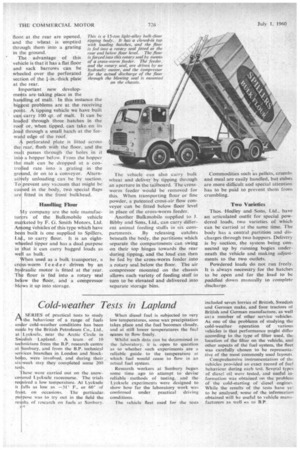Cold-weather Tests in Lapland
Page 74

If you've noticed an error in this article please click here to report it so we can fix it.
SERIES of practical tests to study the behaviour of a range of fuels Cr cold-weather conditions has been by the British Petroleum Co., Ltd.. Lyckselc, near the Arctic Circle in dish Lapland. A team of 10 nicians from the B.P. research centre unbury, and from the B.P. technical ices branches in London and Stockho rn, were involved, and during their six week stay they completed some 200 tes s.
on at
tee at • Sc
:hesewere carried out on the snowen ered Lyeksele racecourse. The trials ret iired a low temperature. At Lycksele
it 'ails as low as ° F., or 60' of
fr st, on occasions. The -particulat% pu pose was to try out in the field the res Its of research on fuels at Sunbury. When diesel fuel is subjected to very low temperatures, some wax precipitation takes place and the fuel becomes cloudy, and at still lower temperatures the fuel oeases to flow freely.
Whilst such data can be determined in the laboratory. it is open to question as to whether such experiments are a reliable guide to the temperature at which fuel would cease to flow in an actual fuel system.
Research workers at Sunbury began some time ago to attempt to devise reliable methods of testing, and the Lycksele experiments were designed to show how far the laboratory work was
confirmed under . practical driving conditions.
The vehicle fleet used for the tests included seven lorries of British, Swedish and German make, and four tractors of British and German manufacture, as well ast a number of other service vehicles. As one of the problems of studying the cold-weather operation of various vehicles is that performance might differ according to the type of filter used, the location of the filter on the vehicle, and other aspects of the fuel system, the fleet was carefully chosen to be representative of the most commonly used layouts.
Comprehensive instrumentation of the vehicles provided an exact record of fuel . behaviour during each test. Several types of diesel oil were tested, and useful information was obtained on the problem Of the cold-starting of diesel engines. While the results of the tests have ye to be analysed; some of the information obtained will be useful to vehicle manufacturers as well is to B.P.




























































































































































